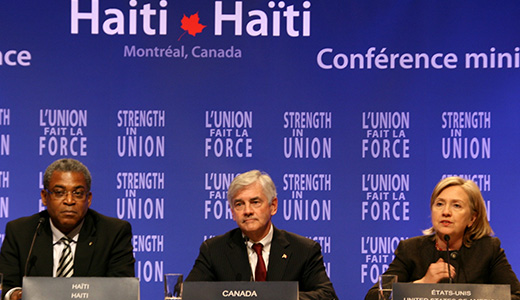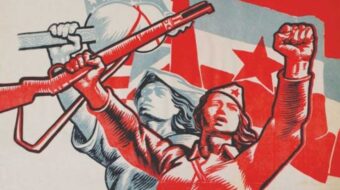
Foreign intervention is Haiti is as problematic as ever. Interviewed by the Swiss daily Le Temps, Brazilian diplomat Ricardo Seitenfus said as much. When the interview was published on December 20, the Organization of American States fired him as its representative in Haiti.
Asked about the 10,000 UN troops in Haiti, Seitenfus responded, “Haiti is not an international threat. We are not in civil war conditions.” After the removal of President Aristide in 2004, he said, the foreign intervention acted to “freeze the power” and “transform the Haitians into prisoners on their own island.” Haiti’s problems are “socio-economic,” said Seitenfus. “When the unemployment rate is at 80 percent, deploying a stabilizing mission is intolerable. There is nothing to stabilize.”
Replying to the question “What prevents normalization?” Seitenfus traced Haiti’s problems back to its history. “For two hundred years the presence of foreign troops has alternated with that of the dictators,” he said. “Haiti’s original sin, on the world stage, is its liberation. [In 1804] the West was a colonialist world, slave-owning and racist, basing its wealth on the exploitation of conquered lands. As a result, the Haitian revolutionary model frightened the great powers. Independence was compromised and the country’s development was road-blocked.”
What about aid? Answer: “Emergency aid is effective; but when it becomes structural, when that aid substitutes for the state in all its missions, a lack of collective responsibility is attained.”
Seitenfus blamed foreign aid agencies for using Haiti as a laboratory, as “a country of professional formation” offering “free rein” to all kinds of humanitarian experimentation. “There is an evil or perverse relationship between the NGOs’ strength and the Haitian state’s weakness,” he said.
For solutions, the diplomat would rely upon Haitian solidarity. “After the earthquake,” he pointed out, “it was the Haitians who, completely alone, with empty hands, tried to save their fellow men ….We must think about offering export opportunities to Haiti and to also protect that family farm system that is essential to the country.”
Seitenfus’ critique applies to $30 million in foreign funds used to pay for national elections on November 28. Exiled president Jean-Bertrand Aristide’s Lavalas Party, the country’s most popular, was excluded.
Over 200,000 dead earthquake victims appeared on the election rolls. Polling stations declined from 12,000 in 2000 to 1,000 last year. The turnout then was 23 percent, down markedly from the 70 percent – 80 percent voter participation in elections prior to 2004, when a U.S.-mediated coup removed Aristide. Foreign honchos are preparing now for second-round voting.
Citing WikiLeaks documents, Mark Weisbrot of the Center for Economic and Policy Research recently explored U.S. motives in Haiti.
“The guiding [U. S.] principle,” he suggests, is that “left governments will be removed or prevented from taking power where it is possible to do so; and the poorest countries – like Honduras last year – present the most opportune targets. A democratically elected government in Haiti, due to its history and the consciousness of the population, will inevitably be a left government – and one that will not line up with Washington’s foreign policy priorities for the region.”
The documents demonstrate U.S. concern that progressive regional governments, especially Venezuela’s, will influence Haiti. They show U.S. diplomats lining up a Brazilian-controlled UN troop presence in Haiti before and after Aristide’s removal.
A study released in December by the Robert F. Kennedy Center for Justice and Human Rights and other groups highlights the negative effects of U.S. food aid on agricultural and human sustainability. Titled in part “The Impact of U.S. Food Aid on Human Rights in Haiti,” the report is available at the center’s website.
The report says, “While coercing Haiti to nearly eliminate its import tariffs on rice, reduce investments in agriculture, and focus on a few crops for export, the United States gradually increased shipments of its own agricultural commodities to Haiti.” It concludes that “Instead of supporting the agricultural production upon which so many Haitians depend, [the U.S. program] has undermined the livelihoods of peasants and small farmers in Haiti.”
Haitian farmers 24 years ago produced 80 percent of the country’s food, but only 42 percent two years ago. Ten percent of children suffer from severe, acute malnourishment. Thirty-three percent are chronically malnourished.
The U.S. government, almost alone in the world, requires donated food to be bought from U.S. suppliers. Transportation accounts for two-thirds of food donation costs. According to the report, “Charities and NGOs are permitted to sell donated food on local markets in order to finance their programs.”
Information provided by this report and by Weisbrot and Seitenfus makes it clear that the undoing of Haiti’s independence, gradually unraveling over two centuries, has in our era been achieved. Human rights in such circumstances become an afterthought. That is reason enough for progressive Americans to take up Haiti’s cause, now.
Photo: Haiti Prime Minister Jean-Max Bellerive, Canada Foreign Affairs Minister Lawrence Cannon and U.S. Secretary of State Hillary Clinton at a press conference of the Haiti Ministerial Preparatory Conference in Montreal, January 25, 2010, where foreign aid efforts for Haiti were discussed. US Mission Canada

MOST POPULAR TODAY


Zionist organizations leading campaign to stop ceasefire resolutions in D.C. area

High Court essentially bans demonstrations, freedom of assembly in Deep South

Afghanistan’s socialist years: The promising future killed off by U.S. imperialism

Communist Karol Cariola elected president of Chile’s legislature






Comments